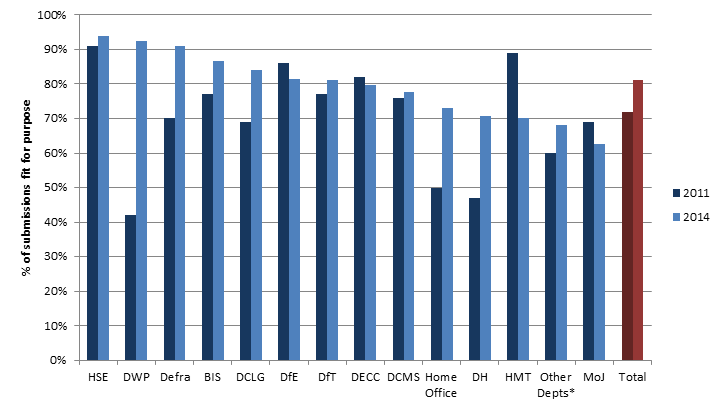Regulatory policy scrutiny: independent advice to government
RPC Chair Michael Gibbons CBE reflects on the RPC’s impact to date and where it needs to go next.

The Regulatory Policy Committee has just been given a new role on monitoring progress toward the government’s new £10bn target for regulatory reduction over this Parliament. In this guest blog, RPC Chair Michael Gibbons CBE reflects on the RPC’s impact to date and where it needs to go next.
The Regulatory Policy Committee (RPC) was formed in November 2009 and became an independent advisory non-departmental public body (NDPB) in 2012. It ensures that when ministers make decisions on regulatory proposals, they do so with the fullest picture possible and in surety that assessments of impacts have been independently validated.
The RPC acts as a crucial part of the better regulation agenda, ensuring that regulatory impacts are systematically subject to assessment, independent of politics. Between December 2009 and May 2010, it played an advisory role in better regulation by selectively reviewing the impact assessments of regulatory proposals that were subject to public consultation, and issued opinions only where there were major concerns regarding the analysis or evidence.
However, the Coalition Government strengthened the RPC’s scrutiny role after the 2010 general election. Ministers said that they did not want the Cabinet’s Reducing Regulation Committee (RRC) to agree any regulatory proposal, unless the RPC had first confirmed that the impact assessment, setting out the underlying evidence base for the proposals, was fit for purpose. For the first time in the UK, there was a government intention that all regulatory proposals should have an impact assessment independently verified as fit for purpose in order to proceed. In addition, the RPC was given the role of independently validating the estimates of the costs and benefits associated with each proposal. This proved vital for the operation of 'One-in, One-out' and 'One-in, Two-out', the Government’s previous rule for reducing the flow of incoming costly regulation.
The RPC has now been appointed as the Independent Validation Body (IVB) charged with verifying the costs and savings of changes in law introduced by the Government that affect business – large and small – and civil society organisations. The RPC will provide independent assurance on the Government’s progress in meeting its commitment to cut £10 billion of red tape over the course of this parliament. In the last parliament, the RPC scrutinised the evidence supporting all government proposals that regulated businesses, charities and voluntary groups before ministers took them forward. In doing so, we considered more than 1,200 distinct proposals and issued just over 2000 opinions.
Overall, the quality of the evidence supporting those proposals – impact assessments – improved, making the regulatory process and use of evidence more transparent. As shown by the figure below, however, departmental performance for all initial impact assessment submissions has been varied. For example, although the Department for Health saw its full scrutiny performance rise each year over the parliament from 47% in 2011 to 73% in 2014, the Treasury saw its equivalent performance measure decrease from 89% in 2011 to 67% in 2014. RPC scrutiny prompted government to reconsider the evidence base for some of its regulatory proposals, and make revisions to the detail of the proposals which have reduced burdens on business, including small and micro-businesses. We also improved the accuracy of government estimates of the impacts of regulation by £585 million per year.
Departmental performance for all initial submissions during the parliament

*“Other departments” combines results from all departments with no more than 11 impact assessments each in any year of this parliament (FCO, Cabinet Office, MOD, FSA, Government Equalities Office, NI Office, Scotland Office)
All of these things, in our view, represent a rather significant achievement, driving up the quality of policy making and bringing transparency to the heart of government. But this should not be the end of the journey. To date, the focus of the RPC and the red tape challenge has been on business – and they are an important stakeholder. But much of what government does has benefits – and imposes costs – on society more widely and it is important that departments show clearly how they have assessed these.
However, RPC analysis shows that departments did not provide a detailed assessment of the impacts of regulation beyond business in a third of cases during the previous parliament. This means that ministers are being asked to make decisions on some new regulation without a complete understanding of their impacts. It also means that there is currently no systematic way for ministers to ensure that only those regulatory proposals that balance total potential benefits to society with the lowest costs to business and others are taken forward.
For some measures it may not make sense, or be proportionate, to put significant resources into quantifying all impacts. But the fact that departmental performance is variable, with some much more capable of identifying and assessing wider impacts, clearly suggests more could, and should, be done. In 2014, for example, the Department for Transport identified wider costs and benefits in more than 60% of its impact assessments, while some other departments did not estimate any wider impacts. One way to overcome this problem would be to ensure that impact assessments supporting new regulation so they do not just focus on the impact of regulation on business. That is, the framework should be reformed to require departments to report more transparently the impacts of the Government’s regulatory reform programme on the welfare of consumers and wider society.
The RPC would like to see the societal impact of a policy reported alongside the business impact. This could improve incentives for departments to prioritise analysis, further research and the development of analytical methods to help monetise wider impacts and emphasise the inclusive benefits of better regulation. I am a passionate believer in the advantages of independent review and scrutiny which has been well used by British Governments in other areas.
- Publisher
- Institute for Government